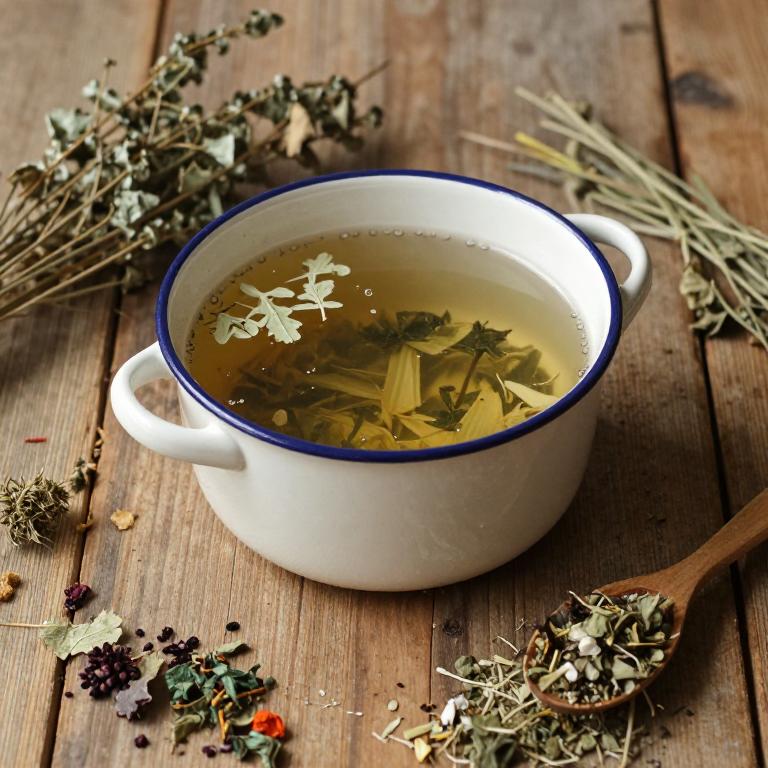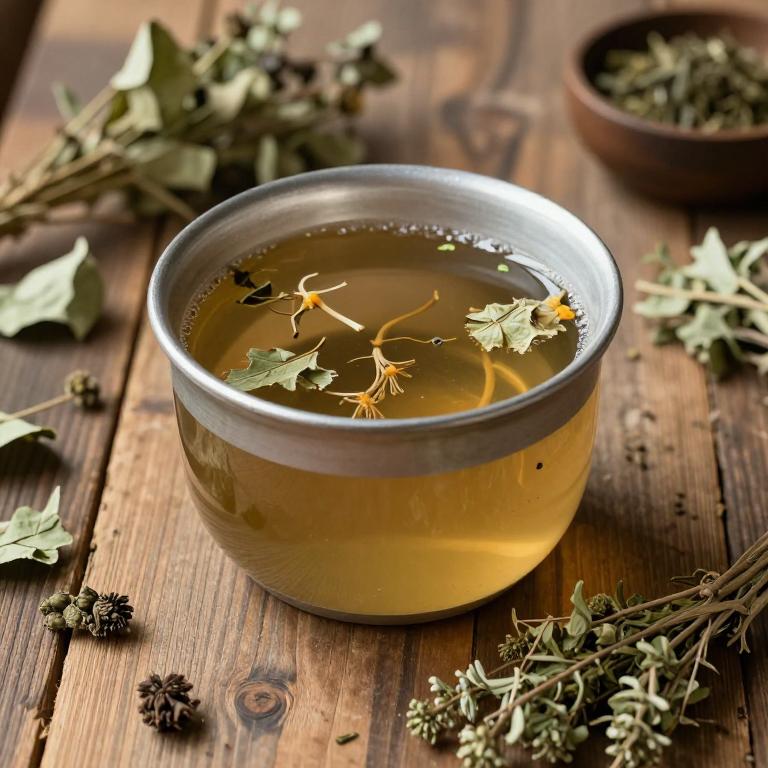10 Best Herbal Decoctions For Dry Hair

Herbal decoctions for dry hair are traditional remedies that use a blend of natural ingredients to nourish and restore moisture to hair strands.
Common herbs such as nettle, horsetail, and chamomile are often included for their ability to strengthen hair and improve scalp health. To prepare a decoction, these herbs are simmered in water for an extended period to extract their beneficial compounds. Applying the warm decoction to the hair and scalp can help reduce frizz, enhance shine, and promote overall hair vitality.
Regular use of herbal decoctions can be a gentle and effective way to address dryness without the harshness of chemical treatments.
Table of Contents
- 1. Aloe vera (Aloe barbadensis)
- 2. Field horsetail (Equisetum arvense)
- 3. Stinging nettle (Urtica dioica)
- 4. Rosemary (Rosmarinus officinalis)
- 5. Thistle (Silybum marianum)
- 6. Bacopa (Bacopa monnieri)
- 7. St. john's wort (Hypericum perforatum)
- 8. European plum (Prunus domestica)
- 9. English lavender (Lavandula angustifolia)
- 10. Salvia (Salvia officinalis)
1. Aloe vera (Aloe barbadensis)

Aloe barbadensis, commonly known as aloe vera, is widely used in herbal decoctions for its soothing and nourishing properties, particularly for dry hair.
When prepared as a decoction, aloe vera extracts the beneficial compounds from its leaves, providing moisture and hydration to parched strands. This herbal remedy is valued for its ability to strengthen hair follicles and promote healthy growth, making it ideal for those with dry, brittle, or damaged hair. The anti-inflammatory and antioxidant properties of aloe help to reduce scalp irritation and improve overall scalp health.
Regular use of aloe barbadensis decoctions can lead to softer, more manageable hair and a healthier, more balanced scalp environment.
2. Field horsetail (Equisetum arvense)

Equisetum arvense, commonly known as horsetail, is a rich source of silica and other minerals that can significantly benefit dry hair.
When prepared as a herbal decoction, it helps strengthen hair shafts and improve overall hair texture by promoting moisture retention. To make the decoction, the dried herb is simmered in water for several hours, allowing the beneficial compounds to infuse into the liquid. This preparation can be used as a rinse or diluted and applied directly to the scalp and hair.
Regular use of horsetail decoction may lead to reduced breakage and increased shine in dry, brittle hair.
3. Stinging nettle (Urtica dioica)

Urtica dioica, commonly known as stinging nettle, is a potent herb often used in herbal decoctions to promote healthy hair growth and alleviate dryness.
When prepared as a decoction, the leaves and stems of stinging nettle are simmered in water to extract their nutrient-rich compounds, including silica, iron, and vitamins A and C. This herbal remedy is believed to strengthen hair follicles, improve scalp health, and enhance moisture retention in dry hair. The decoction can be used as a rinse or applied topically to the scalp for best results.
Regular use of urtica dioica decoctions may help restore luster and softness to dry, brittle hair while supporting overall hair vitality.
4. Rosemary (Rosmarinus officinalis)

Rosmarinus officinalis, commonly known as rosemary, is a versatile herb that has been traditionally used to promote hair health, particularly for those with dry hair.
Its herbal decoctions, made by boiling the leaves in water, are rich in antioxidants, essential oils, and nutrients that help improve scalp circulation and reduce dryness. Regular use of rosemary decoctions can enhance hair elasticity, reduce breakage, and restore moisture to damaged strands. The aromatic compounds in rosemary also have a calming effect, making it a pleasant addition to hair care routines.
Overall, incorporating rosemary herbal decoctions into a hair care regimen can provide natural nourishment and vitality to dry, brittle hair.
5. Thistle (Silybum marianum)

Silybum marianum, also known as milk thistle, is traditionally used in herbal medicine for its potential benefits to hair health.
Herbal decoctions made from the seeds of Silybum marianum are believed to nourish the scalp and promote hair growth by improving circulation and strengthening hair follicles. These decoctions are often prepared by simmering the dried seeds in water to extract their active compounds, such as silymarin, which have antioxidant and anti-inflammatory properties. When used as a scalp rinse or applied topically, Silybum marianum decoctions may help reduce hair breakage and enhance the overall appearance of dry, brittle hair.
However, it is important to consult with a healthcare professional before using these decoctions, especially if you have underlying health conditions or are taking medications.
6. Bacopa (Bacopa monnieri)

Bacopa monnieri, also known as brahmi, is an Ayurvedic herb commonly used in herbal decoctions to promote hair health.
These decoctions are traditionally prepared by boiling the leaves of the plant in water, creating a nutrient-rich liquid that can be used for scalp treatments. Bacopa monnieri is believed to nourish the scalp, improve blood circulation, and strengthen hair follicles, which can help reduce dryness and promote hair growth. The herb is also rich in antioxidants and anti-inflammatory compounds that may protect the hair from environmental damage.
Regular use of bacopa monnieri decoctions may lead to softer, smoother, and more lustrous hair, making it a popular natural remedy for dry hair concerns.
7. St. john's wort (Hypericum perforatum)

Hypericum perforatum, commonly known as St. John's Wort, is traditionally used in herbal medicine for its potential benefits to hair health, particularly for dry hair.
When prepared as a herbal decoction, it is believed to nourish the scalp and promote healthier hair growth by improving circulation and providing essential nutrients. The decoction is typically made by simmering the dried herb in water for an extended period to extract its active compounds. This preparation is often used in combination with other herbs to enhance its moisturizing and strengthening effects.
While more research is needed, many users report improved hydration and reduced dryness when using St. John's Wort decoctions regularly as part of their hair care routine.
8. European plum (Prunus domestica)

Prunus domestica, commonly known as the European plum, has been traditionally used in herbal medicine for its nourishing and conditioning properties.
Herbal decoctions made from the fruit, seeds, or leaves of Prunus domestica can be beneficial for dry hair by providing essential nutrients and moisture. These decoctions often contain antioxidants, vitamins, and minerals that help strengthen hair follicles and improve scalp health. When used as a hair rinse or applied topically, the decoction can restore shine, reduce frizz, and enhance overall hair texture.
Regular use of Prunus domestica decoctions may promote healthier, more manageable hair in individuals with dry or brittle strands.
9. English lavender (Lavandula angustifolia)

Lavandula angustifolia, commonly known as English lavender, is often used in herbal decoctions to promote healthy hair, particularly for those with dry hair.
The decoction is prepared by simmering dried lavender flowers in water, allowing the beneficial compounds to infuse into the liquid. This herbal remedy is valued for its soothing properties, which can help reduce scalp irritation and improve overall hair texture. The essential oils in lavender, such as linalool and lavandin, are believed to nourish and moisturize dry hair strands.
Regular use of lavender decoctions can enhance hair softness, reduce frizz, and support a balanced scalp environment for optimal hair growth.
10. Salvia (Salvia officinalis)

Salvia officinalis, commonly known as sage, has been traditionally used in herbal medicine for its various therapeutic properties, including its potential benefits for hair health.
When prepared as a herbal decoction, sage can be used to rinse the scalp and hair, helping to nourish and strengthen dry, brittle strands. The decoction is believed to improve scalp circulation and reduce excessive oil production, which can contribute to healthier hair growth. Its antimicrobial and anti-inflammatory properties may also help soothe scalp irritations and promote a balanced environment for hair to thrive.
While more research is needed, many users report that regular use of sage decoctions can lead to improved moisture retention and a smoother, more manageable texture in dry hair.